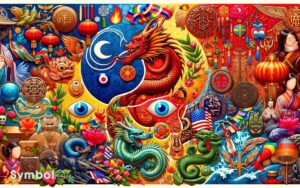What Does Color Black Symbolizes? Elegance, Mourning!
You might find black mysterious or authoritative, a symbol that encapsulates elegance, mourning, and even rebellion. It’s a color that speaks to sophistication, wrapping form in an allure of timelessness and slimness.
When you wear black, you command attention, asserting power without uttering a word. It’s also a universal expression of grief, connecting human experiences across cultures.
Beyond the fashion industry’s embrace for its versatility, black holds deeper meanings; it’s tied to the night sky, fertile soil, and the cycle of life.
It challenges norms, advocating for resistance and change. Exploring its depths will reveal an intricate blend of symbolism and significance.

Key Takeaways
The Essence of Elegance
In the world of fashion, black epitomizes elegance, offering a canvas that both accentuates form and conveys sophistication.
This color, rich in depth and simplicity, allows for the silhouette of an outfit to take precedence, highlighting the architecture of design without the distraction of hue. It’s a choice that speaks to the wearer’s confidence, allowing individuality to shine through understated refinement.
You’ll find that black’s versatility extends beyond mere aesthetic appeal; it’s a strategic choice for creating an illusion of slimness, providing a visual coherence in ensembles.
Additionally, black’s timelessness guarantees that pieces in this shade remain relevant, resisting the fleeting nature of trends.
Hence, black’s prominence in fashion isn’t just about color preference it’s a nuanced decision that enhances the inherent beauty of form, function, and personal expression.
Mourning and Loss
You’ve seen how black symbolizes sophistication; now, let’s examine its role in mourning and loss.
Black’s cultural significance is deeply entwined with its ability to express grief, serving both as a personal and communal emblem of sorrow.
The emotional impact of this color extends beyond personal loss, influencing fashion trends that communicate solidarity and respect during periods of mourning.
Cultural Significance
Across many cultures, black symbolizes mourning and loss, serving as a visual expression of grief and respect for the deceased. This cultural significance is deeply rooted in history, where you’ll find that black attire and objects are often integral to funerary practices.
It’s not merely a color choice but a profound symbol that communicates the depth of sorrow and the solemnity of mourning periods. This tradition, transcending geographical boundaries, indicates a shared human experience of commemorating those we’ve lost.
Analyzing the use of black in mourning rituals reveals its role in providing a collective identity to the bereaved, offering a sense of solidarity and support during times of grief. It’s a visual language that, despite its simplicity, carries the weight of loss and the respect for lives lived.
Emotional Impact
Reflecting on the cultural significance of black in mourning rituals, it’s important to understand how this color not only symbolizes loss but also profoundly influences the emotional landscape of those grieving.
| Aspect | Impact |
|---|---|
| Emotional Weight | Black embodies the weightiness of grief, offering a visual expression of the depth of one’s sorrow. |
| Solidarity | Wearing black signifies a collective mourning, fostering a sense of unity among the bereaved. |
| Progression | It marks the shift from life to death, facilitating the emotional journey of letting go. |
| Protection | Black serves as a shield, guarding the grieving from the external world, allowing for introspection and healing. |
This color’s role in mourning transcends mere tradition; it’s a pivotal element in the emotional processing of loss, offering both a shared language of sorrow and a personal space for reflection.
Fashion Statements
In the world of fashion, black’s association with mourning and loss transcends mere color choice, embodying a profound statement of grief and respect. You’ll find that this tradition isn’t arbitrary but steeped in centuries of cultural practices that span across the globe.
Historically, black signifies the void left by the departed, serving as a visual representation of the somber reality of absence.
It’s a unifying color in times of sorrow, offering a discreet yet powerful means of expressing solidarity with the bereaved.
Additionally, black’s versatility in mourning attire speaks to its deep-seated role in the ritual of grief.
It doesn’t merely signify the end but also denotes respect, dignity, and the profound depth of loss, providing a canvas upon which personal and collective sorrow is acknowledged and shared.
Power and Authority
Within the domain of symbolism, black exudes a commanding presence, often embodying power and authority. This stark hue, prevalent in various cultural and societal contexts, serves as more than just a color. It’s a symbol, interwoven with deep meanings that transcend visual aesthetics.
Here’s why black is synonymous with power and authority:
- Uniformity: Black’s ability to unify disparate elements creates a sense of cohesion and strength.
- Dominance: In many settings, black communicates dominance, often worn by individuals in positions of power to assert their authority.
- Simplicity: Its simplicity lends an air of seriousness and formality, reinforcing the gravitas of authoritative figures.
- Contrast: Black provides a stark contrast, highlighting power dynamics and emphasizing the presence of authority.
Mystery and the Unknown
You’ve observed that black embodies power and authority, but its resonance extends into the enigmatic domains of mystery and the unknown.
This color cloaks the unseen, fostering a fear of the dark that’s rooted in the human psyche, while also symbolizing the allure of secrets and silence.
Through revealing hidden meanings, it invites you to confront what lies beyond the visible, challenging perceptions and encouraging deeper understanding.
Unveiling Hidden Meanings
Black’s association with mystery and the unknown invites you to explore its depth, revealing layers of meaning that often go unnoticed.
As you dive deeper, you uncover its multifaceted significance:
- Infinite Possibilities: Black represents the vast, unexplored universe, suggesting limitless potential and the excitement of the undiscovered.
- Protection and Absorption: It acts as a barrier, absorbing negative energies and offering protection from external influences.
- Sophistication and Elegance: In fashion and design, black exudes a timeless elegance, symbolizing sophistication and refinement.
- Transformation and Rebirth: It signifies the end of one phase and the beginning of another, embodying the concept of death and rebirth, leading to profound change.
Understanding black in these contexts provides a richer appreciation for this enigmatic color, beyond its surface-level perception.
Fear of the Dark
Investigating the fear of the dark reveals a deep human reaction to the mysteries and unknowns that black embodies.
This primal fear, deeply embedded in the human psyche, isn’t merely a childish whim but a profound acknowledgment of what black symbolizes – the vast, unexplored spaces both in our external environment and within ourselves.
Black’s association with the night sky or the depths of the ocean underscores our innate discomfort with the unseen and unknown.
This discomfort stems from an evolutionary need to recognize potential threats, leading to an instinctive unease around black’s boundless depth.
It’s a color that doesn’t reflect light, creating a void where our imagination fills in the blanks, often with anxiety and apprehension. This reaction to black, then, isn’t just about fear; it’s a reflection of our complex relationship with the unknown.
Secrets and Silence
Delving into the symbolism of black reveals its profound connection to secrets and silence, embodying the essence of mystery and the unknown. This color, often enveloping the world in the absence of light, serves as a canvas for the unspoken and the unseen.
Consider its role in various contexts:
- Cultural Ceremonies: In many cultures, black attire symbolizes respect for the mysteries of the afterlife.
- Art and Literature: Black often represents the unknown, enticing viewers and readers into a world of speculation.
- Fashion: Black clothing can symbolize elegance while guarding the wearer’s personal mysteries.
- Nature: The depths of the ocean or the vastness of space, both swathed in black, remind us of the vast unknowns that still exist.
In each instance, black’s association with secrets and silence invites you to ponder the depths beneath the surface.
Fashions Timeless Hue
In the realm of fashion, black’s lasting appeal transcends trends, serving as a canvas that both conceals and reveals, embodying elegance and versatility.
It’s a hue that defies the fleeting nature of fashion, remaining steadfast in its ability to impart sophistication and depth.
Black’s significance in fashion is multifaceted; it symbolizes power, simplicity, and the infinite potential for self-expression.
Designers leverage its neutrality to craft silhouettes that range from the understated to the bold, proving its unparalleled adaptability.
For you, the wearer, black offers a foundation upon which personal style can flourish, enabling the accentuation of individuality without the distraction of color.
Its timeless nature ensures that it remains a cornerstone of wardrobes worldwide, a confirmation of its universal appeal and enduring significance.
Cultural Interpretations
The cultural significance of the color black varies widely across different societies, reflecting a rich tapestry of meanings that encompass everything from mourning and mystery to sophistication and rebellion.
Here’s a deeper look:
- Mourning and Loss: In many cultures, black is the traditional color of mourning, symbolizing the absence of light and life. It’s worn at funerals and periods of grieving to signify respect and remembrance for the deceased.
- Mystery and Unknown: Black often represents the unknown or the unseen, evoking feelings of mystery and intrigue. It’s a color that can both conceal and reveal.
- Sophistication and Elegance: In fashion and design, black is synonymous with sophistication, symbolizing sleekness, power, and timeless elegance.
- Rebellion and Resistance: Historically, black has been adopted by various subcultures as a symbol of rebellion against societal norms and authority, embodying a form of resistance and independence.
Black in Nature and Symbolism
Exploring the domain of nature, black manifests as a profound symbol that carries an array of interpretations, from the ominous to the sublime.
In the depths of the night sky, black serves as a canvas to the universe, suggesting infinity and the vast unknown. It’s the color of fertile soil, promising growth and sustenance, yet it also symbolizes the inevitable end, mirroring the cycle of life and death.
The duality of black in nature represents a balance, reminding you of the interconnectedness of all things. It’s a color that doesn’t just absorb light;
It absorbs meanings, becoming a powerful symbol in the natural world that resonates with the complexities of existence and the profound mysteries that envelop life itself.
The Color of Rebellion
Black’s embodiment as a symbol of rebellion reveals its capacity to challenge norms and provoke thought, illustrating its profound impact across various cultural landscapes.
You’ve likely observed its usage in numerous contexts, each serving as a demonstration to its multifaceted nature.
Here are four key aspects where black’s rebellious spirit shines:
- Fashion: It defies conventional beauty standards, empowering individuals to express dissent and autonomy.
- Political Movements: Black clothing and flags often symbolize solidarity and resistance against oppression.
- Art and Literature: Artists and writers use black to question societal norms and explore darker themes of human existence.
- Youth Subcultures: It signifies a departure from mainstream values, embracing alternative lifestyles and ideologies.
Through these examples, you can appreciate how black transcends mere color, embodying a powerful statement against conformity.
Conclusion
Ironically, the color black, often deemed the absence of all colors, fills our lives with rich symbolism and depth. You’ve discovered its elegance, its embodiment of loss, power, and the unknown.
While it’s the epitome of fashion‘s evergreen nature, it also reveals cultural depths and nature’s subtleties.
‘In your exploration, black’s paradoxical role as a symbol of rebellion against conformity emerges, beautifully illustrating that sometimes, the most profound statements are made not in the presence of color, but in its perceived absence.






